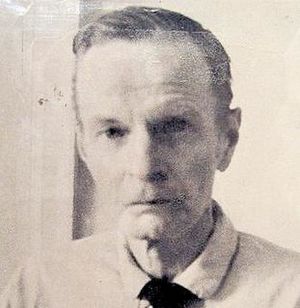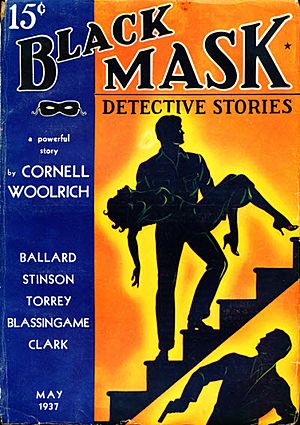Cornell Woolrich facts for kids
Quick facts for kids
Cornell Woolrich
|
|
|---|---|
 |
|
| Born | Cornell George Hopley Woolrich December 4, 1903 New York City, US |
| Died | September 25, 1968 (aged 64) New York City, US |
| Pen name | William Irish, George Hopley |
| Occupation | Writer (novelist) |
| Alma mater | Columbia University |
| Spouse |
Violet Virginia Blackton
(m. 1930; annulled 1933) |
Cornell George Hopley Woolrich (born December 4, 1903 – died September 25, 1968) was an American writer. He wrote many novels and short stories. He sometimes used other names like William Irish and George Hopley.
A writer named Francis Nevins Jr. thought Woolrich was one of the best crime writers of his time. He ranked him after famous authors like Dashiell Hammett and Raymond Chandler.
Contents
About Cornell Woolrich
Woolrich was born in New York City. His parents separated when he was young. He lived in Mexico with his father for a while. Later, he returned to New York to live with his mother, Claire Attalie Woolrich.
He went to Columbia University but left in 1926. This was when his first novel, Cover Charge, was published. A writer named Eddie Duggan said Woolrich started writing while he was sick. He wrote Cover Charge during this time.
Early Writing Career
Cover Charge was one of his "Jazz Age" novels. These stories were like those by F. Scott Fitzgerald. The next year, his short story Children of the Ritz won a $10,000 prize. This led him to work as a screenwriter in Hollywood.
While in Hollywood, Woolrich married Violet Virginia Blackton. She was the daughter of J. Stuart Blackton, who helped start the Vitagraph movie studio. His marriage ended in 1933. He also did not get many screenwriting jobs.
Woolrich wanted to be a novelist again. He had written six novels between 1926 and 1932. These books were about young people and their parties. But by the 1930s, this type of story was not popular. He could not find a publisher for his seventh novel. So, he decided to try a new kind of writing.
Becoming a Crime Writer
Woolrich then started writing "pulp" and detective fiction. Pulp fiction was popular in magazines printed on cheap paper. He wrote so much that his stories often appeared under his different pen names.
For example, his 1942 story "It Had to Be Murder" was published as "William Irish." This story later became the famous 1954 Alfred Hitchcock movie Rear Window.
Two other movies were made from his novels by director François Truffaut. These were The Bride Wore Black (1968) and Waltz into Darkness (1969), which became Mississippi Mermaid.
Later Life and Legacy
Woolrich moved back to New York City. He and his mother lived in hotels, including the Hotel Marseilles. Even though his writing made him rich, he lived simply.
His mother passed away in 1957. After this, Woolrich's health began to decline. He continued to socialize with other writers sometimes. In his 60s, his eyesight became poor. He had a serious foot infection that led to a leg amputation in 1968.
After his surgery, Woolrich returned to his hotel. He used a wheelchair. He died in 1968 and was buried with his mother in Ferncliff Cemetery.
Woolrich left about $850,000 from his estate to Columbia University. This money helps students who want to study writing. His writings are also kept at the Columbia University Libraries.
Movies Based on Woolrich Stories
Many of Cornell Woolrich's stories and novels have been made into movies. Here are some of them:
- Manhattan Love Song (1934)
- Convicted (1938)
- Street of Chance (1942)
- The Leopard Man (1943)
- Phantom Lady (1944)
- The Mark of the Whistler (1944)
- Deadline at Dawn (1946)
- Black Angel (1946)
- The Chase (1946)
- Fall Guy (1947)
- The Guilty (1947)
- Fear in the Night (1947)
- The Return of the Whistler (1948)
- I Wouldn't Be in Your Shoes (1948)
- Night Has a Thousand Eyes (1948)
- The Window (1949)
- No Man of Her Own (1950)
- The Earring (1951)
- The Trace of Some Lips (1952)
- If I Should Die Before I Wake (1952)
- Don't Ever Open That Door (1952)
- Rear Window (1954)
- Obsession (1954)
- The Glass Eye (1956)
- Nightmare (1956)
- Escapade (1957)
- Ah, Bomb! (1964)
- The Boy Cried Murder (1966)
- The Bride Wore Black (1968)
- Mississippi Mermaid (1969)
- Kati Patang (1970)
- Seven Blood-Stained Orchids (1972)
- You'll Never See Me Again (1973)
- Martha (1974)
- Gun Moll (1975)
- Union City (1980)
- I Married a Shadow (1983)
- Cloak & Dagger (1984)
- I'm Dangerous Tonight (1990)
- Mrs. Winterbourne (1996)
- Rear Window (1998)
- Original Sin (2001)
- Four O'Clock (2006)
See also
 In Spanish: Cornell Woolrich para niños
In Spanish: Cornell Woolrich para niños
 | DeHart Hubbard |
 | Wilma Rudolph |
 | Jesse Owens |
 | Jackie Joyner-Kersee |
 | Major Taylor |


